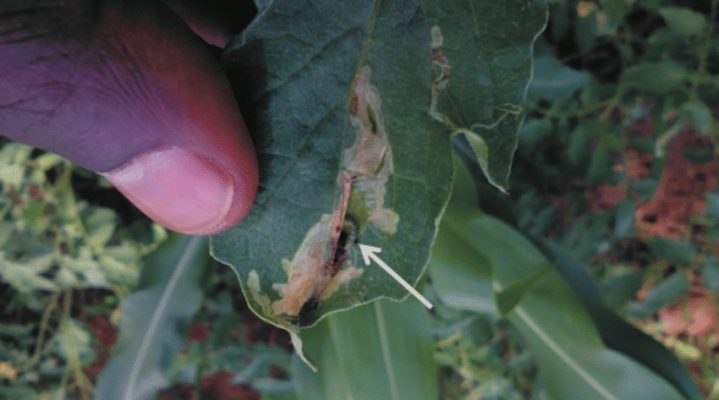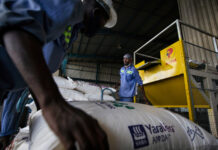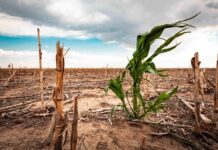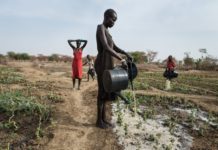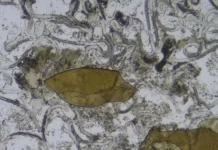| Move to ban pesticides being used to curb locusts and Fall Army Worn will lead to crop devastation, warn growers
Agricultural and industry organisations have today called on the government of Kenya to intervene to secure due process in the country’s pesticide regulation, amid warnings that a current initiative by four NGOs could wipe out the country’s food production within months. A move to secure a ban by parliament of 262 pesticides approved for use in Kenya would slash the country’s maize production by 70 per cent, create a ballooning locust problem and lead to the collapse of the agriculture sector, warned the growers and scientists. The calls come in response to a petition to parliament seeking the banning of the products that are currently being used to prevent the infestation of Kenyan maize by Fall Army Worm and to curb the locust invasion in northern Kenya. The petitioners want the pesticides banned following a change in the European pesticide regulation, which has seen the EU abandon risk assessment as a basis for approving pest control products. Instead of considering the safety of products when they are used in pest control, as elsewhere in the world, the EU now approves products only where they are non-hazardous in all circumstances, meaning, for instance, that consumers could safely drink them. “The consequences of changing our pesticide approval criteria, by default, without changing our current laws, without scientific assessments, and as an appeal to elected members of parliament who have no background on pesticide approvals, will be literally catastrophic,” said Fresh Produce Consortium CEO, Ojepat Okisegere. “We lost 70 per cent of our maize production in 2017 to Fall Army Worm, which is now restored due to pest control. If we now ban the pesticide, we shall move back to crop devastation, in an environment where pest infestation is skyrocketing across our agricultural production,” he said. The pest infestation rate for cabbages would move to around 98 per cent, tomatoes to 24 per cent, produce such as flowers, French beans and soybeans, to around 66 per cent, and 40 to 80 per cent on wheat and other crops, he said. “Pest such as Tuta absoluta, which is notorious in attacking tomatoes can wipe out 100 per cent of the yields within days, and attacks whenever the host is available. Female pests can produce up to 260 eggs in 21 days, while stem borer, FAW and cutworms have been the famous pests attacking our maize crops cutting our yields by almost half,” said Ojepat. The ban would leave farmers grappling with pests like Aphids, Whiteflies, Thrips, Moths, and Spider mites, weeds and fungi’s that farmers, as well as locusts, which have now spread in Wajir, Marsabit, Samburu, Garissa, Isiolo counties and are already depleting northern Kenya’s food supply. Locusts can cause 80 to 100 per cent crop losses, leaving behind barren land. “The organic farming methods being pushed with the pesticide ban petition cannot beat a locust invasion such as this one: we need pesticides to fight them and salvage the little food that still exists,” said Ojepat. Currently, through the Ministry of Agriculture’s consultation with FAO, the government is fighting the locusts with pesticides such as Fenitrothion, which is in the petitioners proposed list of pesticides to be banned. “If we ban the use of insect pesticides such as Fenitrothion used to eradicate desert locust, close to Sh22bn worth of food produce such as wheat, maize will be lost this year alone,” said Dr Evelyne Samita, a member of the Entomology Society of Kenya. Overall, the ban would affect crops and livelihoods in five agriculture producing regions, with Rift Valley and Central set to be the hardest hit, followed by Western, Eastern and the Coast. “Just 10 of the pest control products in the list are used in over 20 crops spanning maize, French beans, flowers, beans, cabbage, wheat, potatoes, tomatoes, soy beans, onions, rice, bananas, and fruits among others. Banning these pesticides means production of these crops would be slashed,” said Joel Mutai Regulatory & Liaison Manager, Agrochemicals Association of Kenya. |
Speech by Eric Kimunguyi, CEO of the Agrochemicals Association of Kenya, given to the media on 23rd January 2020, on the launch of case studies demonstrating the impact of banning safe pesticides in a ‘back door’ overturning of Kenya’s Pest Control Products Act
Ladies, gentlemen, members of the press, I should like to start by thanking you for joining us today to present some of the details of the potential food crisis that faces us, and the grave and serious need for due process in our pesticide regulation.
I think you may all be aware that Kenya has long-standing and best-in-class legislation covering the regulation of pesticides, which is set out in the Pest Control Products Act and which is applied by the Pest Control Products Board.
It is worth beginning today by stating clearly that the PCPB is staffed by many excellent scientists and that the legislation and regulatory structure we have only allows pesticides to be approved for use in Kenya where they have been subjected to the most thorough international testing and approved for use by leading testing regimes, such as the US and Australia.
Thus, we do not venture into accepting pesticides for use that are deemed or classed as a risk to health or the environment elsewhere.
This is despite the fact that we face many pests that are not found in the northern hemisphere, or which Europe may never have to grapple with, such as locusts, for instance. There are no locusts in Europe.
Yet, as we now battle our biggest locust invasion in 25 years, our strongest line of attack in curbing the scale of the locust swarms and slowing their breeding are limited approved insecticides such Fenitrothion, which the government is now air spraying in an effort to save billions of shillings worth of crops and to prevent a serious famine in our lands.
I mention Fenitrothion because it is just one of 262 active ingredients that several proponents wish to see banned in our country. These products have been banned nowhere else in Africa. They are approved for use and in use in the US, in Australia, and very widely across the globe.
But there are two things that have prompted these groups to seek the exclusion for Kenya alone in Africa from using pesticides such as the ones we are using to curb the locusts, and such as the pesticide we are using to control Fall Army Worm on our maize.
As a result, for us, alone, they would rather that Fall Army Worm went untreated, as it did in 2017, when we lost 70% of our maize harvest as a result.
Their first reason for wanting this is that they are committed to organic farming and against all pesticide use as a matter of principle. We respect the commitment of all organisations to organic agriculture and have no issue whatsoever with the development and application of organic methods and products, indeed, we laud such efforts.
But to take that commitment to the level that we must settle down for a barren year of harvests destroyed by locusts, or accept the loss of our maize and staple crops to the Fall Army Worm, even where that generates famine and many thousands of deaths from starvation: this we cannot support.
Where we have pesticides that have been through testing that typically takes six to nine years, to establish that they are safe to use for pest control, safe to human health and safe to the environment, and those products can maintain our maize harvest in the face of the Fall Army Worm, it is a very grave matter indeed to ban that protection and we need a solid reason, a surety that all those Kenyan deaths will be worth it, in order that we condemn so very many Kenyans to hardship and absolute destruction.
The NGOs have, in this regard, claimed that these pesticides are giving us cancer and affecting our reproduction and have recently been banned in Europe as a result.
This is not true. In fact, what has happened is that Europe, and Europe alone internationally, has changed its rules on all pesticides. It has moved to a regime that is called hazard assessment, whereas the rest of the world applies risk assessment.
Under hazard assessment if a chemical can do any harm in any way, for instance, if you drank a bottle of it, then it is a hazard, and will no longer now be considered for use in Europe. If Europe applied the same rules to all its household cleaning products, almost all of the current cleaning products would be banned – few are safe for a child to drink instead of milk or water.
The decision by Europe to reject all chemicals except safely consumable ones has been controversial in Europe and globally and is a dispute playing out elsewhere.
But while that happens, no country anywhere in the world has been prompted a ban most of its pesticides as a follow-on to Europe’s new regulation.
Yet, in Kenya, the NGOs have petitioned parliament to ignore our own scientists, the US approvals, everything, and end our own approval regime, which approves pesticides only for uses that do not harm human health or the environment, in order to adopt the European regime instead.
They want it done without due process too. They do not care for our legislative process or raising a Bill of Law for all authorities to assess. They do not care for the impact assessments that are obligatory for our legislation. And, it seems, at this stage, that they do not care for the impact of such a move.
So, just to fill in a gap left by these petitioners, like letting Kenya by laid waste by locust and ending our maize production in the face of uncontrolled Fall Army Worm, we are here today to share some details with you on the impact of making Kenya a first in the world, as a country that ran a legal risk assessment regime but banned the majority of its pesticides anyway, because it was asked to by organic NGOs.
In fact, they have not made the same case in Tanzania, or Uganda, so maybe we can buy our maize from our neighbours who will still be able to protect their corps from the FAW.
In truth, this banning will wreck Kenya and all our lives. It will push us all into near instant food insecurity and an extreme famine. It will fell our horticultural industry and a huge swathe of our exports. So let us take such matters seriously.
We have legal processes. If we want to change the way we approve pesticides then we can debate that, follow the prescribed procedures, and assess the impact too.
It is, in our view, beyond unacceptable that there are many thousands of Kenyans alive and well today who are likely to die this year, in 2020, if a single effort by a tiny group of NGOs is allowed to co-opt our entire regulatory system and due process, and make us a lone and single country in Africa without the tools left to defend our food yields or our agricultural exports.
As even a single act in the 262 bannings requested, it is a decision of huge gravity to throw away our pest control on the Fall Army Worm.
The same is true on locusts.
So we are today asking the President to take note of this debate too, before we descend into absolute relative poverty in Africa, moving ourselves from a leading position economically on our continent to a position at the bottom of the league in feeding our people and earning our livelihoods.
Agriculture is the core of our economy. No one is asking that we stop using organic methods or promoting them in every possible way. But we are asking that we stay with the Constitution, with the law, with due process, and ensure that the impact of all our approvals is fully assessed by scientists and organised to ensure the fewest deaths and best possible lives for all Kenyans.
Health matters. These products undergo tests that cost approximately Sh23bn to ensure they are safe for the uses they are proposed for. There is nothing safe about starving to death in a move to ignore all those test results.
On which note, let me thank you, again, for your time today, and pass the floor to Okisegere Ojepat, CEO of the Fresh Produce Consortium, to give us the perspective of growers from across our nation.



